David M. Lesser Fine Antiquarian Books has published a new catalogue of Rare Americana. This one is Catalogue 212 of “Significant and Unusual Imprints Relating to America.” Most titles range from the middle of the 18th to the early 20th century. It was a time of great expansion and glory for the United States, but you'd never guess that from most items herein. This is the day-to-day reality, and then, like now, Americans were a contentious people. The controversies then were like the ones of today. The refrain “why can't we all just get along” will never apply to us. Perhaps it's that tension that pushes Americans forward to new heights, but still, can't we all just get along? Lesser's catalogue brings us back to those days when our differences became so great that we went to war with each other.
The 1850s was the time that the American union unraveled. Nothing was going to resolve the crisis short of a miracle or war. Abraham Lincoln understood this when he gave this Speech of Hon. Abraham Lincoln, Delivered in Springfield. Saturday Evening, July 17, 1858. Lincoln repeats from an earlier speech, “A house divided against itself can not stand.” He then continues, “I believe that this Government cannot endure permanently half slave and half free. It will become all one thing or all the other.” He notes that earlier compromises have only augmented agitation. He presciently says, “In my opinion, the agitation will not cease till a crisis have been reached and passed.” Two years later, that crisis was reached. Lincoln defends himself from claims by his opponent in the Illinois senate race of 1858 and later presidential election of 1860, Stephen A. Douglas, from charges he wished this to happen. Lincoln explains, “...I indicated no wish or purpose of my own; I simply expressed my expectation.” Item 65. Priced at $5,000.
Two years earlier, an event on the floor of the Senate displayed how bad the divisions had become. Massachusetts Senator Charles Sumner gave a speech in which he attacked slavery and some of its supporters, including South Carolina Senator Andrew Butler. Representatives Preston Brooks, also from South Carolina and a cousin of Butler, took offense. Two days later, he approached Sumner while the latter was working at his desk. Brooks proceeded to beat Sumner to within an inch of his life with a cane. It would be three years before Sumner was able to return to the senate and suffered from his injuries the rest of his life. Brooks was tried in the District of Columbia court and convicted of assault but received only a fine. The House of Representatives defeated a motion to expel him. Brooks resigned his seat, but was then promptly reelected. His luck ran out only a year later when illness killed him. Item 14 is Disunion Document no. 1. Speech of Honourable Preston R. Brooks. Delivered at Columbia, South Carolina, Aug. 29, 1856. It is a pamphlet of ceremonies honoring Brooks, who was presented a cane “for the prompt and appropriate manner in which he chastised the notorious Charles Sumner.” Brooks said, “the moral tone of mind which would lead a man to become a Black Republican would make him incapable of courage, and would involve a loss of all honor and moral principle whatever.” Ironic from a someone who beat an unarmed man almost to death with a cane. Item 14. $600.
Item 91 is a reward poster dated September 1, 1874. It says, $20,000 REWARD Has been offered for the recovery of Charlie Brewster Ross, and for the arrest and conviction of the abductors. He was stolen from his parents in Germantown, PA., on July 1st, 1874. Four-year-old Charlie and his five-year-old brother Walter were abducted from their yard, enticed with candy, by two men in a carriage. Walter was released a few miles up the road, but Charlie was not. The kidnappers sent ransom notes to the family. They assumed the family was wealthy because of their big house but in reality, Christian Ross, their father, was deeply in debt. With the assistance of wealthier Philadelphians, the Rosses hired Pinkerton detectives to find their son, and they issued this poster in that cause. The case had become national news. The Rosses heard from the kidnappers who demanded $20,000 for the return of their son, but several attempts to deliver the money failed. The kidnappers failed to show, evidently in the not unjust fear that they were being set up. In December, two men caught in a burglary were shot. One died instantly, the other lingered for two hours. He reportedly confessed but did not say where Charlie was. This left his whereabouts a mystery. Charlie was never found, though several men over the years claimed to be him. Those claims were debunked. $1,500.
This book goes back to the time when education essentially was memorization. Caleb Bingham provided such a tool in 1795 with his An Astronomical and Geographical Catechism, for the Use of Children. It consists of questions and answers. Of course, a lot has been learned since then but you can't expect perfection from science 230 years old. One of the questions is “How many primary planets are there.” The answer was “Seven, which revolve around the Sun in the following order: Mercury, Venus, Earth, Mars, Jupiter, Saturn, and Herschel.” Herschel? Quite a name for a planet. Whatever happened to planet Herschel? It seems it received a name change, though perhaps to one that is subject to even more ridicule than would a planet named “Herschel” endure. It is now known as Uranus. It was given its forgotten early name in some places as it had been discovered by William Herschel. However, like the other planets, it was eventually named for one of the ancient Greek gods, not you-know-what. Item 10. $1,500.
Mrs. Bowen must have been someone special. Next is her invitation to the inaugural ball for President James K. Polk, held at Carusi's Saloon in Washington. There were two inaugural balls for Polk, the $10 one and the $2 one. This is the better one, meant for the more aristocratic. Polk attended both. Mrs. Bowen got to celebrate with the likes of future President James Buchanan, Thomas Hart Benton, Stephen Douglas, John C. Calhoun, and John Tyler Jr., son of Polk's predecessor in the White House. Polk was a compromise candidate, a surprise winner. As promised, he served only one term. Polk is today one of the more obscure presidents, but his impact was great. He brought Texas into the union, fought a war with Mexico, and expanded American territory beyond Texas to capture California, Oregon, and the Southwest. Polk focused on expansion while avoiding as much as possible the burgeoning issue of slavery. He was what today we would call a “workaholic,” having little time for recreation or travel. When his time was up, Polk kept his word and left, completing his term on March 4, 1849. The rigors of his office and a long post-presidential tour left Polk exhausted and on June 15 of that year, Polk died, age 53. Item 92. $1,500.
David M. Lesser Fine Antiquarian Books may be reached at 203-389-8111 or dmlesser@lesserbooks.com. Their website is www.lesserbooks.com.

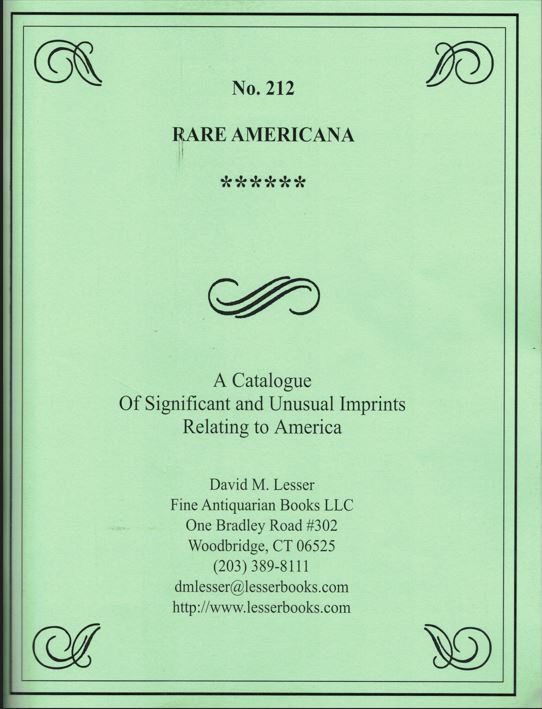
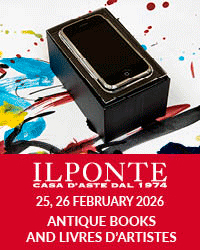
![<b>Il Ponte, Feb. 25-26:</b> HAMILTON, Sir William (1730-1803) - Campi Phlegraei. Napoli: [Pietro Fabris], 1776, 1779. € 30.000 - 50.000 <b>Il Ponte, Feb. 25-26:</b> HAMILTON, Sir William (1730-1803) - Campi Phlegraei. Napoli: [Pietro Fabris], 1776, 1779. € 30.000 - 50.000](https://ae-files.s3.amazonaws.com/AdvertisementPhotos/0372eeb9-97e1-47b2-baca-b3287d4704ee.jpg)
![<b>Il Ponte, Feb. 25-26:</b> [MORTIER] - BLAEU, Joannes (1596-1673) - Het Nieuw Stede Boek van Italie. Amsterdam: Pieter Mortier, 1704-1705. € 15.000 - 25.000 <b>Il Ponte, Feb. 25-26:</b> [MORTIER] - BLAEU, Joannes (1596-1673) - Het Nieuw Stede Boek van Italie. Amsterdam: Pieter Mortier, 1704-1705. € 15.000 - 25.000](https://ae-files.s3.amazonaws.com/AdvertisementPhotos/8f9ce440-b420-4407-8293-eb8e1b38ca19.jpg)
![<b>Il Ponte, Feb. 25-26:</b> TULLIO D'ALBISOLA (1899-1971) - Bruno MUNARI (1907-1998) - L'Anguria lirica (lungo poema passionale). Roma e Savona: Edizioni Futuriste di Poesia, senza data [ma 1933?]. € 20.000 - 30.000 <b>Il Ponte, Feb. 25-26:</b> TULLIO D'ALBISOLA (1899-1971) - Bruno MUNARI (1907-1998) - L'Anguria lirica (lungo poema passionale). Roma e Savona: Edizioni Futuriste di Poesia, senza data [ma 1933?]. € 20.000 - 30.000](https://ae-files.s3.amazonaws.com/AdvertisementPhotos/71bb9667-5d66-4aa8-96a2-9880c74a7a26.jpg)
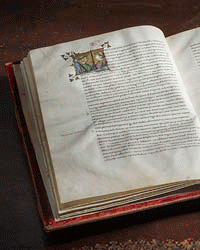
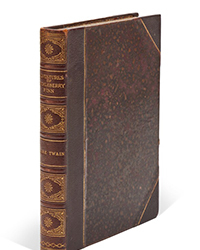
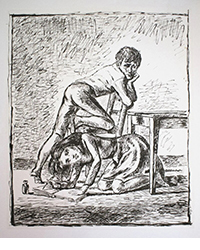
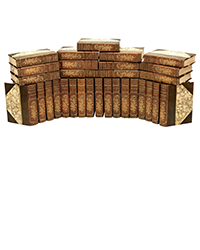
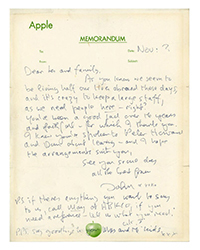
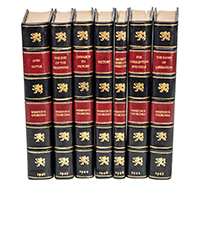
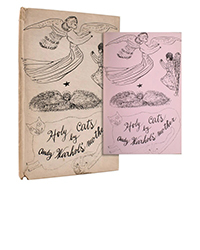
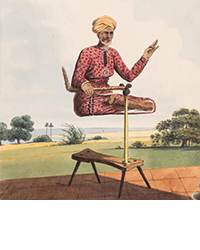
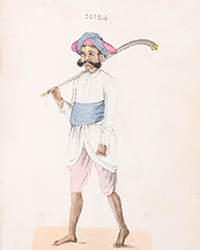
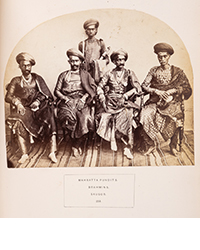
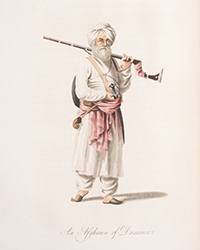
![<b>Forum, Feb. 19:</b> Lot 57<br>[Album and Treatise on Hinduism], manuscript treatise on Hinduism in French, 31 watercolours of Hindu deities, Pondicherry, 1865. £3,000-4,000 <b>Forum, Feb. 19:</b> Lot 57<br>[Album and Treatise on Hinduism], manuscript treatise on Hinduism in French, 31 watercolours of Hindu deities, Pondicherry, 1865. £3,000-4,000](https://ae-files.s3.amazonaws.com/AdvertisementPhotos/f70b3790-9b4a-4990-b402-f0322021c0de.jpg)
![<b>Forum, Feb. 19:</b> Lot 62 Allan (Capt. Alexander). <i>Views in the Mysore Country,</i>
[1794]. £2,000-3,000 <b>Forum, Feb. 19:</b> Lot 62 Allan (Capt. Alexander). <i>Views in the Mysore Country,</i>
[1794]. £2,000-3,000](https://ae-files.s3.amazonaws.com/AdvertisementPhotos/ad2cf7b4-4d93-4231-a956-b440583b39b3.jpg)
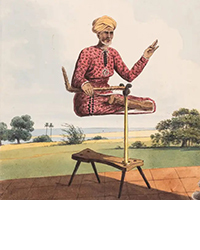
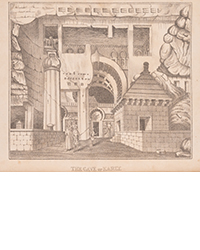
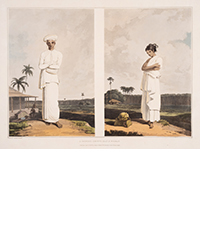
![<b>Forum, Feb. 19:</b> Lot 123<br>D'Oyly (Charles). <i>Behar Amateur Lithographic Scrap Book,</i> lithographed throughout with title and 55 plates mounted on 43 paper leaves, [Patna], [1828]. £3,000-5,000 <b>Forum, Feb. 19:</b> Lot 123<br>D'Oyly (Charles). <i>Behar Amateur Lithographic Scrap Book,</i> lithographed throughout with title and 55 plates mounted on 43 paper leaves, [Patna], [1828]. £3,000-5,000](https://ae-files.s3.amazonaws.com/AdvertisementPhotos/5651043b-3c0d-4e2c-931f-72133bda9b36.jpg)
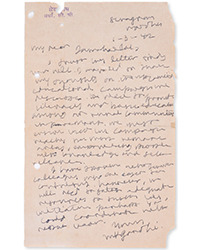
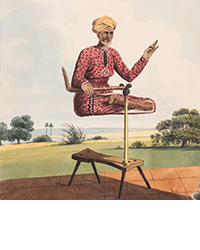
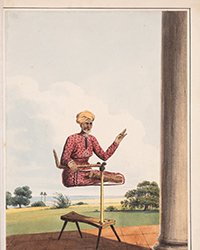
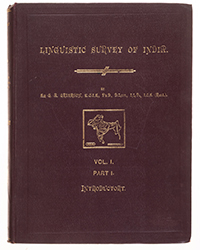
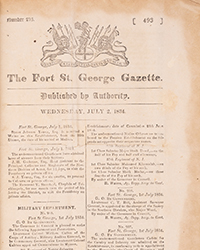
![<b>Forum, Feb. 19:</b> Lot 205<br>Marshall (Sir John) and Alfred Foucher. <i>The Monuments of Sanchi,</i> 3 vol., first edition, 141 plates, most photogravure, [Calcutta], [1940]. £3,000-4,000 <b>Forum, Feb. 19:</b> Lot 205<br>Marshall (Sir John) and Alfred Foucher. <i>The Monuments of Sanchi,</i> 3 vol., first edition, 141 plates, most photogravure, [Calcutta], [1940]. £3,000-4,000](https://ae-files.s3.amazonaws.com/AdvertisementPhotos/8c8244b7-4573-44d3-9c70-e0d3a3ed3cc4.jpg)